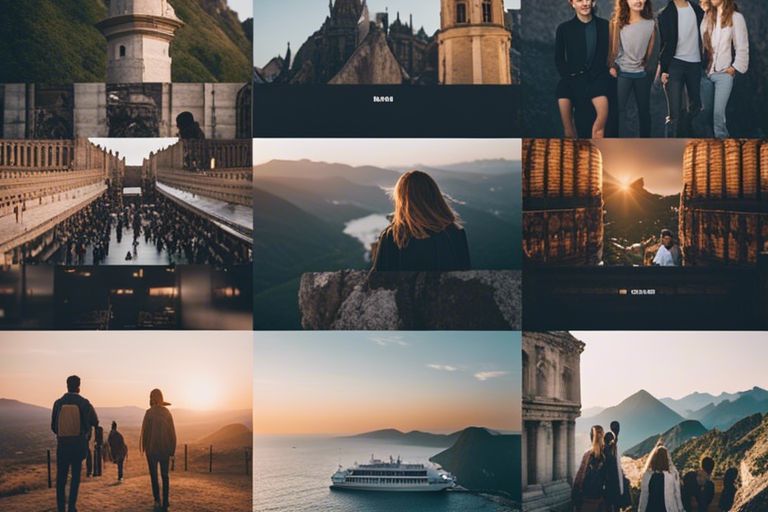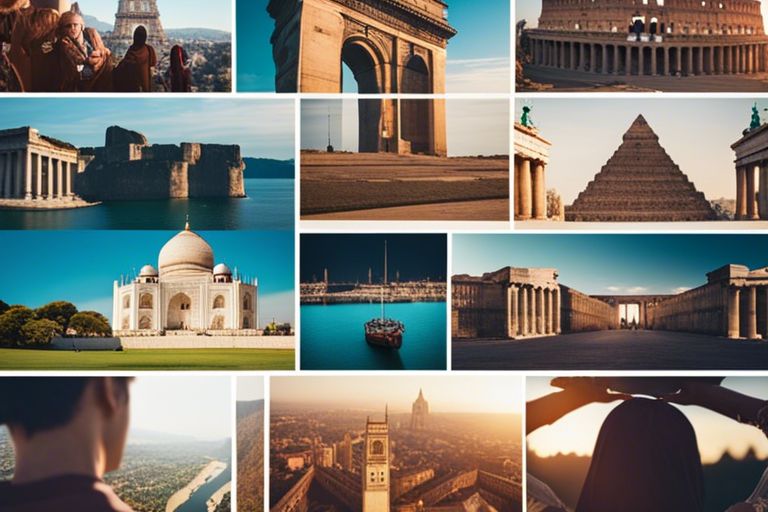Many students launching on a study abroad experience are eager to not only broaden their academic horizons but also immerse themselves in the culture and sights of their host country. Traveling on a budget, engaging in cultural activities, and making the most of weekends and breaks are key components to fully take advantage of this unique opportunity. In this blog post, we will provide valuable tips and insights on how to make the most of your study abroad experience through exploration and travel.
Key Takeaways:
- Plan Ahead: Research destinations, transportation options, and activities in advance to make the most of your time and budget.
- Embrace Cultural Immersion: Step out of your comfort zone by trying local foods, learning the language, and engaging with the local community.
- Utilize Weekends and Breaks: Take advantage of long weekends and school breaks to explore nearby cities and countries, making the most of your time abroad.
- Budget Travel: Look for student discounts, use public transportation, stay in hostels or Airbnb, and opt for local food to save money while traveling.
- Create Lasting Memories: Take photos, journal your experiences, and connect with fellow students to share stories and create lasting memories of your study abroad adventure.
Planning Your Travels
Setting Travel Goals During Your Study Abroad
Any study abroad experience presents a unique opportunity to explore new places and cultures. To make the most of your time overseas, it’s crucial to set clear travel goals. Whether you aim to visit specific landmarks, immerse yourself in local traditions, or simply take in the beauty of your host country, defining your travel objectives will help you plan your trips effectively and make the most of your weekends and breaks.
Budgeting for Trips: Saving and Spending Wisely
Study abroad is a time for growth and exploration, and travel is often a significant part of that journey. Budgeting for trips is crucial to ensure that you can experience all that your host country and beyond have to offer without breaking the bank. By setting a realistic travel budget, you can save money and make informed spending decisions during your time abroad.
When budgeting for trips, consider factors such as transportation, accommodation, meals, and activities. Look for budget-friendly options like student discounts, public transportation passes, and affordable dining choices to stretch your funds further. By planning ahead and being mindful of your expenses, you can enjoy enriching travel experiences without financial stress.
Understanding Your Host Country
There’s no better way to truly immerse yourself in a new culture than by delving into the local customs and traditions of your host country. Taking the time to understand the way of life, social norms, and behaviors of the locals can greatly enhance your study abroad experience. From trying traditional cuisine to participating in cultural festivals, embracing the local culture can help you develop a deeper appreciation for your surroundings.
Delving into the Local Culture and Customs
On weekends and breaks, make a point to explore different parts of your host country and engage with the local community. Whether it’s visiting historical sites, attending cultural events, or simply chatting with locals at a neighborhood cafe, these experiences can provide valuable insights and enrich your cultural understanding. By immersing yourself in the day-to-day life of your host country, you can create lasting memories and forge meaningful connections.
Language Skills: Communicating and Connecting with Locals
An necessary aspect of cultural immersion is developing language skills to communicate effectively with locals. Learning the basics of the local language can open doors to new experiences and foster deeper connections with the community. Consider enrolling in language courses or practicing with native speakers to improve your linguistic abilities. By overcoming language barriers, you can truly engage with the culture and people around you, enhancing your overall study abroad experience.
Weekend Excursions and Short Trips
Discovering Hidden Gems Close to Home
After a busy week of classes and studying, weekends are the perfect time to venture out and explore the unique treasures that are often hidden just a short distance from your host city. Take advantage of local festivals, markets, and attractions to immerse yourself in the culture and traditions of your temporary home. Chat with locals, sample regional cuisine, and visit off-the-beaten-path spots to truly experience the essence of your host country.
Travel Logistics: Accommodation, Transportation, and Itineraries
On short trips and weekend excursions, careful planning and organization are key to maximizing your time and resources. Research budget-friendly accommodations such as hostels, Airbnbs, or guesthouses to save money without sacrificing comfort. Utilize public transportation, ridesharing services, or group tours to get around efficiently and affordably. Creating a flexible itinerary with must-see sights and activities will help you make the most of your brief getaway.
Don’t forget to pack light and smart for your short trips – a small backpack with necessarys and versatile clothing can make traveling easier and more enjoyable. Keeping copies of important documents, staying connected with local SIM cards or international data plans, and having emergency contacts handy are also important aspects of ensuring a smooth travel experience.
Traveling During Academic Breaks
Venturing Further Afield from Your Host Country
One of the most exciting aspects of studying abroad is the opportunity to explore beyond your host country. Utilizing academic breaks and weekends to travel to nearby countries or regions can provide a rich cultural experience and broaden your perspective on the world. Research budget travel options such as discount airlines, train passes, or group tours to make the most of your time and resources.
Navigating Longer Travels: Visas, Health Precautions, and Safety Tips
To ensure smooth travels during longer trips, it is crucial to plan ahead for visas, health precautions, and safety measures. Check visa requirements for each country you plan to visit and apply well in advance to avoid any last-minute complications. Make sure to visit a healthcare provider to get necessary vaccinations and medications for the destinations you will be exploring.
- Check travel advisories and safety tips for each country
- Pack vital items such as a first aid kit, copies of important documents, and emergency contact information
Health
For instance, if you plan to visit countries with a high risk of malaria, it is vital to take antimalarial medication and use insect repellent to minimize the chances of contracting the disease. Additionally, staying hydrated, eating well, and getting enough rest are all crucial components of staying healthy and energized during your travels.
- Stay updated on health advisories and recommendations for each destination
- Carry a good travel insurance policy that covers medical emergencies and evacuation

Building a Global Friendship Network
Linking Up with Fellow Study Abroad Students
The key to a fulfilling study abroad experience is not just exploring new places, but forging connections with others who share your sense of adventure. Keep in mind that your fellow study abroad students are in the same boat as you, eager to explore and immerse themselves in the host country’s culture. It’s a great opportunity to bond over shared experiences, collaborate on travel plans, and build lasting friendships. Be proactive in reaching out, attending group activities, and forming study groups to get to know your peers on a deeper level.
Engaging with the International Community and Locals
Connecting with the local community and international students outside of your program is a fantastic way to expand your cultural horizons and gain a deeper understanding of the host country. Locals can offer insights into their culture, traditions, and way of life that you might not encounter as a tourist. It’s a chance to practice the local language, participate in community events, and develop a global mindset. Interacting with a diverse group of individuals can enrich your study abroad experience and broaden your perspective on global issues.
It’s important to be respectful and open-minded when engaging with the international community and locals. Show interest in their customs, listen actively, and be willing to learn from their experiences. By forming meaningful connections with people from different backgrounds, you’ll not only enhance your interpersonal skills but also gain valuable insights that can shape your worldview for years to come.

Documenting Your Journey
Once again, as you initiate on your study abroad journey, it is important to capture and document your experiences along the way. Refer back to the 10 Tips On How To Maximize Your Study Abroad Experience for inspiration and guidance on making the most of this incredible opportunity. By documenting your journey, you can create lasting memories and reflect on the transformative moments that will shape your time abroad.
Capturing Memories: Photography and Journaling
With a camera in hand or a journal by your side, you can capture the sights, sounds, and emotions of your study abroad experience. Take photos of vibrant street markets, historic landmarks, and memorable moments with new friends. Additionally, journaling can help you process your thoughts and feelings, providing a deeper insight into your personal growth during your time abroad.
Sharing Your Experiences: Blogs and Social Media
Your study abroad journey is a unique story waiting to be shared with the world. By creating a blog or sharing posts on social media, you can connect with friends, family, and fellow travelers while inspiring others to initiate on their own adventures. Share travel tips, cultural insights, and memorable experiences to create a digital scrapbook of your time abroad.
It’s important to remember to respect the privacy of others in your posts and to be mindful of cultural sensitivities when sharing your experiences online. Use hashtags to reach a wider audience and engage with like-minded individuals who share your passion for travel and cultural exploration.
Balancing Travel with Academic Commitments
Despite the allure of exploring new destinations while studying abroad, it is important for students to find a balance between their travel adventures and academic responsibilities. By effectively managing their time, students can make the most of their study abroad experience without compromising their education.
Time Management Strategies
With the right time management strategies in place, students can prioritize their academic commitments while still carving out time for travel and cultural exploration. Utilizing tools such as calendars, to-do lists, and study schedules can help students stay organized and on track with their coursework. Setting realistic goals and deadlines for both academic and travel-related activities can prevent last-minute stress and ensure a well-rounded study abroad experience.
Juggling Coursework and Leisure Activities without Overextending
Commitments to academic coursework and extracurricular activities can sometimes be overwhelming for study abroad students. However, it is vital to strike a balance between academic responsibilities and leisure pursuits to avoid burnout. By setting boundaries, prioritizing tasks, and practicing effective time management, students can enjoy their travel experiences without compromising their academic performance. It is important to remember that studying abroad is a unique opportunity to learn and grow both academically and personally, so finding a balance between work and play is key to making the most of this experience.
Traveling and exploring new cultures while studying abroad can be a transformative experience for students. By effectively managing their time, balancing academic commitments with leisure activities, and prioritizing their travel experiences, students can make the most of their study abroad journey and create lasting memories that will stay with them long after the program ends.
Post-Study Abroad: Reflecting and Applying Your Experiences
Bringing Your Travel Perspectives Home
Post-study abroad, it is crucial to reflect on the valuable experiences gained during your time exploring your host country and beyond. Allowing yourself time to process and internalize these experiences will help you make the most of them in your future endeavors. By bringing your travel perspectives home, you can continue to explore new cultures, foster a global mindset, and further enhance your personal growth.
Utilizing International Exposure in Your Future Career
Reflect on your experiences gained from budget travel, cultural immersion, and making the most of breaks and weekends during your study abroad program. Utilizing your international exposure in your future career can set you apart in today’s competitive job market. Employers value candidates with a global perspective and adaptability, making your study abroad experiences a valuable asset in your professional journey.
Building on the skills acquired during your time abroad, such as intercultural communication, adaptability, and problem-solving, can help you succeed in a variety of career paths. By highlighting these experiences on your resume and during job interviews, you can demonstrate to potential employers your ability to navigate diverse environments and work effectively with individuals from different backgrounds.
Final Words
With this in mind, it’s important for students studying abroad to take advantage of the opportunities for travel and exploration that come their way. Budget travel doesn’t have to mean sacrificing comfort or experiences – with a little research and planning, it’s possible to see amazing places without breaking the bank. By immersing themselves in the local culture, students can gain a deeper understanding of the host country and its people, making their study abroad experience truly enriching.
Keep in mind, breaks and weekends are valuable times to explore both the host country and neighboring regions. Whether it’s a day trip to a nearby town or a weekend getaway to a different country, every adventure adds to the richness of the study abroad experience. So pack your bags, grab your passport, and set out to discover all that the world has to offer during your time abroad.
FAQ
Q: How can students maximize their study abroad experience through travel and exploration?
A: Students can maximize their study abroad experience by actively exploring their host country and beyond. This can be done through budget travel, cultural immersion, and making the most of breaks and weekends.
Q: What are some tips for budget travel while studying abroad?
A: Tips for budget travel while studying abroad include booking flights in advance, staying in hostels or budget accommodations, cooking meals instead of eating out, and taking advantage of student discounts.
Q: How can students immerse themselves in the culture of their host country?
A: To immerse themselves in the culture of their host country, students can participate in local festivals and events, take language classes, volunteer with local organizations, and try traditional foods and activities.
Q: How can students make the most of their breaks and weekends while studying abroad?
A: Students can make the most of their breaks and weekends by planning ahead, researching nearby attractions and destinations, joining organized tours or group activities, and networking with other students to discover hidden gems.
Q: What are some important safety tips for students traveling and exploring during their study abroad experience?
A: Important safety tips for students include always carrying identification and emergency contact information, staying aware of their surroundings, avoiding risky behaviors, and keeping in touch with family and friends. It’s also advisable to have travel insurance and register with the local embassy or consulate.

